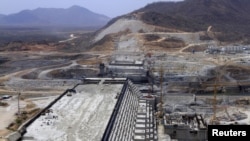Egypt, Ethiopia, and Sudan signed an agreement Tuesday finalizing the two firms tasked with carrying out studies on the potential impact of Ethiopia's Grand Renaissance Dam on the flow of the Nile, the countries' foreign and water ministers said.
The three countries had initially picked French firm BRL and Dutch firm Deltares in April, but Deltares later withdrew, leading them to replace it with French firm Artelia on Tuesday.
The leaders of the three countries signed a cooperation deal in Khartoum in March that paved the way for a joint approach to regional water supplies.
Cairo and Addis Ababa had previously been locked in a bitter war of words over Ethiopia's $4 billion project.
Tuesday's agreement came after talks between the foreign and water ministers of the three countries had to be extended for a third day.
Technical studies will start in February, when the six ministers are due to meet again, and will take between six and 15 months, said Moataz Mousa, Sudan's minister of water resources, irrigation and electricity.
But even before the impact studies have been started, officials say 50 percent of the dam's construction has been completed.
"We are satisfied with the results of this meeting and look forward to achieving a strategic partnership," said Egyptian Foreign Minister Sameh Shoukry.
Accord's principles
The principles in the March agreement included giving priority to downstream countries for electricity generated by the dam, setting up a mechanism for resolving conflicts, and providing compensation for damages.
Signatories also pledged to protect the interests of downstream countries when the dam's reservoir is filled.
Addis Ababa has long complained that Cairo was pressuring donor countries and international lenders to withhold funding from the 6,000-megawatt dam, which is being built by Italy's largest construction firm, Salini Impregilo SpA.
Egypt, which relies almost exclusively on the Nile for farming, industry and domestic water use, has sought assurances that the dam will not significantly cut the river's flow to its rapidly growing population.
Ethiopia, the source of the Blue Nile, which joins the White Nile in Khartoum and runs on to Egypt, says the dam will not disrupt flow. It hopes the project will transform it into a power hub for the electricity-hungry region.
"We see the agreement over these companies as progress and look forward to actualizing the interests of the three countries. We believe the dam will be useful to the three countries," said Ethiopian Foreign Minister Tedros Adhanom.
The Grand Renaissance Dam is the centerpiece of Ethiopia's bid to become Africa's biggest power exporter. Addis Ababa plans to spend some $12 billion on harnessing its rivers for hydro power production in the next two decades.





